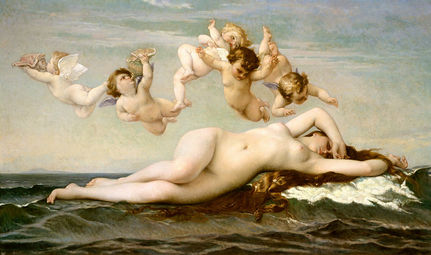
It is one of the reasons I chose to include the painting in a pivotal scene in the novel The City of Earthly Desire. In the scene, Reinhardt tries to communicate the essence of beauty to his teenaged son Béla who has stumbled into the chaotic realm of sexual awakening:
___________________________________________________________
Just before the school year ended, Reinhardt had a revelation and invited Béla to the Metropolitan Museum of Art. They had not gone to a museum together in years. Béla diplomatically declined the invitation citing a burdensome load of homework as an excuse, but Reinhardt insisted. Ten minutes later, they were both sitting on the N train as it clacked along its elevated track en route to Manhattan. Once at the museum, Reinhardt made a beeline to the European Paintings section on the second floor and parked Béla in front of Alexandre Cabanel's Birth of Venus.
“Tell me what you see,” Reinhardt said.
“Venus.”
“More detail.”
“Venus is a young woman with long hair. She's supine on the waves in the sea with a team of little angels hovering over her. Her head is turned to the side and it looks like she might be sleeping, but if you look closely, you can see she is looking directly at the viewer.”
“Haven't you forgotten something?”
Béla winced.
“Is she wearing any clothes?” Reinhardt asked.
“No. She's nude.”
“Do you find her beautiful?”
Béla looked at his father warily. “Yes. I think she's very beautiful.”
“Do you feel aroused when you look at her? Do you want her?”
Béla became red-faced – it dawned on him that the trip to the museum was just another of his father's sex talks in disguise “Sure. I guess.”
“You guess?”
“Okay. Yes. I want her. Can we drop it? I don't feel comfortable talking about wanting a girl in a painting.”
Reinhardt ignored his son's pleas and pressed on. “Do you think that is the reason why Cabanel painted this nude? To arouse lust?”
Béla looked down at the polished floor beneath his feet and wondered what his father was aiming at. The question contained a hidden purpose, but he was clueless as to what that hidden purpose might be. He looked at the painting again. “I don't know. Maybe. No, on second thought. No.”
“Are you sure? Look at her. See her? Don't you want to climb into the painting and jump on top of her?”
Béla's red-face became even redder. Part of him did want to climb into the painting; he imagined himself wrapping his arms around her, cupping her breasts in his hands. In many ways, the Cabanel nude was no different from the nameless models in his secret hiding place magazines – she displayed the same intimate parts, struck an inviting pose – but the Cabanel nude was different somehow. Part of him wanted to jump on top of her, yet another part of him wanted to simply look at her and admire the beauty she projected.
“Sexuality is a tricky subject for artists. This painting is a good example of that,” Reinhardt said. He had planned out everything he wanted to say in advance, yet at that moment, he still struggled to find the right words. His voice wavered slightly as he spoke, but he felt more confident about what he was saying than he had on previous occasions. “You're at the age where you will begin to explore sexuality. Sex is one of the few ways a person can step out of themselves and form a union with another person. Because of this, it is a very serious subject and is not to be taken lightly either in art or in life. These days many people think sex is nothing more than a sport or a hobby. A mere recreational activity with no emotions or consequences involved. People who believe such things do not understand the sublimity and sacredness of sex.”
Béla analyzed the message contained in his father's words. He wondered why Reinhardt had badgered him for months about sex.
“Why are you talking to me about this?”
“You're at the age-”
“Are you saying I should wait until I'm married to have sex?”
“That would be ideal, but I'm realistic. Chances are you will have sex before you are married. And if you do, I want you to understand the seriousness of sex. I want you to approach it with love, not lust.”
Love not lust. Béla pondered the phrase for a moment. Soon every muscle in his body stiffened and his mouth gaped open; he looked very much like a person who had just been drenched with a bucket of ice-cold water. The notebook! He had left one of his notebooks in the studio. That's what had triggered his father's sudden interest in discussing sex. His face reddened so much, parts of it took on purple hues.
“The problem with sex is it is inspired by desire. Desire can come from two very different sources: love and lust,” Reinhardt explained. He found the expression on his son's face disquieting, yet plowed ahead regardless. “Love appeals to the higher elements within us. It is elegant and refined. Love appreciates beauty. Admires it. Nurtures it. Preserves it. Lust, on the other hand, appeals to the lower elements within us. It is grotesque and coarse. Lust misjudges beauty. Scorns it. Deprives it. Destroys it.” Reinhardt looked back at the painting. “Love makes sex sacred; lust makes sex profane. Sex without love is vulgar. Maybe Cabanel struggled with this when he painted this painting. Is it art or is it indecent? Do you understand what I'm trying to tell you?”
Béla nodded and did his best to appear nonchalant, but shame and embarrassment were corroding his insides like acid. To his relief, Reinhardt said no more about sex or love or The Birth of Venus. Instead, he suggested they return home to Queens.

 RSS Feed
RSS Feed

